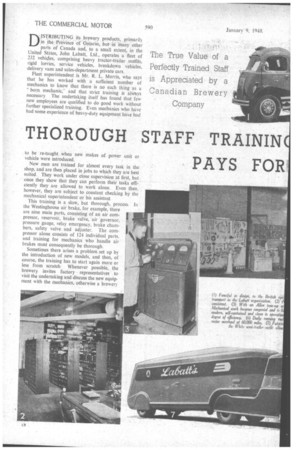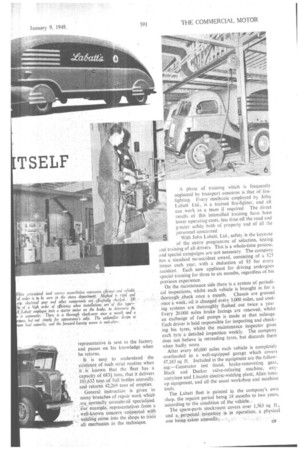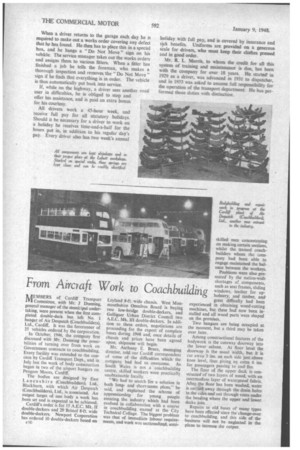THOROUGH STAFF TRAININ PAYS FOR
Page 46

Page 47

Page 48

If you've noticed an error in this article please click here to report it so we can fix it.
The True Value of a Perfectly Trained = Staff is Appreciated by a Canadian Brewery Company
DISTRIBUTING its brewery products, primarily in the PrOVince of Ontario,. but in inany other parts of Canada and, to a small extent, in the United States, John Labatt, Ltd., operates a fleet of 232 vehicles, comprising heavy tractor-trailer outfits, rigid lorries, service vehicles, breakdown vehicles, .delivery vans and sales-department private cars.
Fleet superintendent is Mr. R. L. Morris, who says that he has worked with a sufficient number of mechanics to know that there is no such thing as a " born mechanic," and that strict training is always necessary The undertak,ing itself has found that• few new employees are qualified to do good work without further specialized training. Even mechanics who have had some experience of heavy-duty equipment have had to be re-taught when new makes of power unit or vehicle were introduced.
New men are trained for almost every task in the shop, and are then placed in jobs to which they are best suited. They work under close supervision at first, but once they show that they can perform their tasks efficiently they are allowed to work alone. Even then. however, they are subject to constant checking by the mechanical superintendent or his assistant This training is a slow, but thorough, process. In the Westinghouse air brake, for example, there are nine main parts, consisting of an air compressor, reservoir, brake valve, air 'governor, pressure gauge, relay emergency, brake chambers, safety valve and adjuster. The compressor alone consists of 124 individual parts, and training for mechanics who handle air brakes must consequently be thorough.
Sometimes there arises a problem set up by the introduction of new models, and then, of course, the training has to start again more or less from scratch Whenever possible, the brewery invites factory representatives to visit the undertaking and discuss the new equipment with the mechanics, otherwise a brewery
hue articulated ;road carricr nevertheless represents efficient urn( reliable of order is to be seen in the stores department: Method is r;gid and rig, electrical gear and other components are:dectkelt checked: (4) , be of a high order of efficiency when installations are O1 this type _Labatt employee tests a starter motor on the brake; to determine the is automatic: There is a thorough chec-k-ouer once a month and a ranee,. but not :antdy for appearance s sake. The Unfamiliar design of load capacity, and the forward-leaning screen is anti-flare.
representative -is sent to the factor) and passes on his knowledge when he returns.
It is easy to understand the existence of such strict routine when it is' known that the fleet has a capacity of 6834 tons, that it delivers 101,632 tons of full bottles annually, and returns 42,269 tons of empties.
General instruction is given in many branches of repair work which Are normally considered specialiled. ior examPle, representatives from a well-known concern connected with welding come into the shops to train all mechanics in the technique.
A phase of training which is frequently neglected by transport concerns is that of firefighting. Every mechanic employed by John Labatt, Ltd., is a trained fire-fighter, and all can work as a team if required The direct results of this intensified training have been lower operating costs, less time oft the road and greater safety both of property and of all the personnel concerned.
With John Labatt, Ltd., safety is the keynote of the entire programme of selection, testing and training of all drivers This is a whole-time process, and special campaigns are not necessary. The company has a standard no-accident award, consisting of a $25 bonus each year, with a deduction of $5 for every accident. Each new applicant for driving undergoes special training for three to six months, regardless of his previous experience. On the maintenance side there is a system of periodical inspections, whilst each vehicle is brought in for a thorough :check once .a month. Chassis are greased once a week, oil is changed every 3,000 miles and cooling systems are thoroughly flushed out twice a year Every 20,000 miles brake facings are renewed, whilst an exchange of fuel pumps is made at that mileage. Each driver is held responsible for inspecting and checking his tyres, Whilst the maintenance inspector gives each tyre a 'detailed inspection weekly. The company does not believe in retreading tyres, but discards them when badly worn. .
After .every 60,000 miles' each vehicle is completely overhauled in a well-equipped garage which covers 47,183 sq. ft. Included in the equipment are the follow-. ing:--Generator test tand, brake-renovating gear, Black and Decker valve-refacing machine, oxyacetylene and Lincoln electric-welding plant, Allen tuneup equipment, and all the usual workshop and machine
tools. . .
The Labatt fleet is painted in the company's own shop, the 'repaint period being 18 months to two years, according to the condition of the Vehicle,.
The spare-parts stockroom 'covers over 1,563 sq ft., and a.,,,perpetnal :inVentoiy is in Operation,. a physical one being7takenannuaI1y, . When a driver returns to the garage each, day he is required to make out a works order covering any defect that he has found. He then has to place this in a special box, and he hangs a "Do Not Move" sign on his vehitle. The service manager takes out the works orders and assigns them to various fitters. When a fitter has finished a job he tells the foreman, who makes a thorough inspection and removes, the "Do Not Move" sign if he finds that everything is in order. The vehicle is thus automatically put back into service.
If, while on the highway, a driver sees another road user in difficulties, he is obliged to stop and offer his assistance, and is paid an extra bonus for his courtesy.
All drivers work a 45-hour week, and receive full pay for all statutory holidays. Should it be necessary for a driver to work on a holiday he receives time-and-a-half for the hours put in, in addition to his regular day's pay. Every driver also has. two week's annual
holiday with. full pay, and is covered by insurance and sick benefits. Uniformsare provided on a generous scale for drivers, who must keep their clothes pressed and in good. order.
MT. R.. L. Morris, to whom the credit for all this system of training and maintenance is due, has been with the company for over 18 years. He started in 1929 as a driver, was advanced in 1931 to dispatcher, and in 1933 was asked to assume full responsibility for the operation of the transport department. He has performed those duties with distinction.




























































































